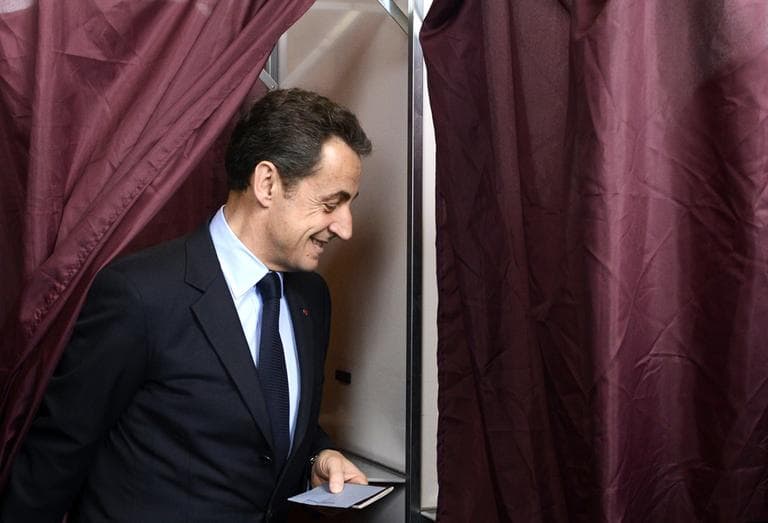Advertisement
Turnout Solid In French Presidential Election

The first-round balloting will trim down a list of 10 candidates from across the political spectrum to two finalists for a May 6 runoff.
Polls for months have shown that conservative Sarkozy and Socialist Francois Hollande are likely to make the cut - and suggest Hollande would win the campaign finale. Many voters are turned off by conservative Sarkozy's flashy style as they worry about jobs and the economy.
The Interior Ministry said early turnout figures showed 70.6 percent of France's 44-million-plus voters cast ballots before noon - less than the 73.8 percent in 2007 at the same time, but more than in the four previous races. Overall turnout in the 2007 first round was nearly 84 percent, the highest figure since the 1970s.
The campaign has been marked by frustration with the incumbent and the rise of the extremes. Voters may hand higher-than-expected support to far-right nationalist Marine Le Pen or Communist-backed firebrand Jean-Luc Melenchon.
While they are not expected to win, a strong performance by one or all of them could influence the second-round vote. Centrist candidate Francois Bayrou may take votes from the mainstream, while the other five candidates are expected to receive low single-digit support.
Sarkozy and Hollande have pushed for a strong turnout on the idea that it would help the political mainstream and dilute the impact of more ideological voters.
"This is an election that will weigh on the future of Europe. That's why many people are watching us," said Hollande after voting in Tulle, a town in central France. "They're wondering not so much what the winner's name will be, but especially what policies will follow."
"I am in a competition in which I must give new breath of life to my country and a new commitment to Europe," he added.
Sarkozy waved to supporters and apologized to polling station attendants "for the big fuss" as he voted at a high school in posh western Paris along with his wife, Carla Bruni-Sarkozy - and a throng of journalists in tow. Behind barriers, a small crowd chanted "Bravo! Bravo!" as they left.
Balloting got under way Saturday in France's embassies and overseas holdings. Polls have shown that concerns about jobs - with the unemployment rate hovering near 10 percent - and the economy are top issues.
Whatever happens to France's leadership will affect the rest of the 27-nation European Union.
France was one of six countries that in the 1950s founded the predecessor of the EU, and is the eurozone's second-largest economy after Germany.
Sarkozy and German Chancellor Angela Merkel - a tandem that some call "Merkozy" - have championed a treaty on budget austerity for the 17-nation eurozone. But Hollande wants the treaty to also address economic growth, not just cost-cutting, arguing that's the only way for Europe to recover.
At a time when voters across Europe have ousted incumbents amid economic woes, a Hollande victory would tilt the continent's political balance to the left as EU states such as Greece, Italy, Ireland and Spain work to wriggle their way out of crushing state debts.
Foreign policy has played barely a role in this campaign but will be a big part of the next president's job. Candidates of many stripes want to bring France's 3,600 troops home from the NATO-led mission in Afghanistan, and Hollande has vowed a fast timetable: A pullout by the end of this year.
The campaign has often centered on hot-button issues such as immigration, Islam in France, and calls for higher taxes on the rich - which experts suggest will in fact have little effect on France's high state budget deficit.
Hollande, who wants to tax high-income earners at 75 percent, has tapped into a fear of the free market that has always held more sway in France than almost anywhere in the West, and has enjoyed a resurgence in the era of Occupy Wall Street and anti-banker backlash.
"I think most people are not satisfied with the last five years, people want change, especially in terms of job creation," said voter Eli Lazovsky, a 38-year-old hotel manager, after casting a ballot in a well-to-do Paris neighborhood off the Champs-Elysees.
More than anything else, this campaign is a referendum on the man currently in charge.
Sarkozy inspired voters in 2007 with pledges to break with the past and make France a more dynamic economy. After an initial wave of reforms, his momentum fizzled.
Municipal employee Marie-Francaise Gouyet, 55, said she didn't believe the polls that suggested that Sarkozy is likely to lose to Hollande in the second round. She said she favored the president's economic policies.
"We don't have the choice, we have to stick to austerity," she said, adding that she voted for Sarkozy. "'Sarko' put in place important reforms like for pensions. He has a good record for his first 5 years."
Entrepreneur Mohammed Derisse, 37, who backs Hollande, countered: "We can't spend much more money. But the president has to do it with less pressure. Sarkozy was too much pressure. Hollande wants to do it in a soft way, not hurt the people."
Sarkozy is battling to avoid becoming France's first one-term president since Valery Giscard d'Estaing lost to Socialist Francois Mitterrand in 1981.
Sarkozy has said he'll pull out of politics if he loses.
This program aired on April 22, 2012. The audio for this program is not available.